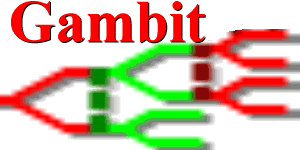gambit-enumpoly: Compute equilibria of a game using polynomial systems of equations#
gambit-enumpoly reads a game on standard input and computes Nash equilibria by solving systems of polynomial equations and inequalities.
This program searches for all Nash equilibria in a strategic game using a support enumeration approach. This approach computes all the supports which could, in principle, be the support of a Nash equilibrium. For each candidate support, it attempts to compute totally mixed equilibria on that support by successively subdividing the space of mixed strategy profiles or mixed behavior profiles (as appropriate). By using the fact that the equilibrium conditions imply a collection of equations and inequalities which can be expressed as multilinear polynomials, the subdivision constructed is such that each cell contains either no equilibria or exactly one equilibrium.
For strategic games, the program searches supports in the order proposed by Porter, Nudelman, and Shoham [PNS04]. For two-player games, this prioritises supports for which both players have the same number of strategies. For games with three or more players, this prioritises supports which have the fewest strategies in total. For many classes of games, this will tend to lower the average time until finding one equilibrium, as well as finding the second equilibrium (if one exists).
When the verbose switch -v is used, the program outputs each support as it is considered. The supports are presented as a comma-separated list of binary strings, where each entry represents one player. The digit 1 represents a strategy which is present in the support, and the digit 0 represents a strategy which is not present. Each candidate support is printed with the label “candidate,”.
The approach of subdividing the space of totally mixed profiles assumes solutions to the system of equations and inequalities are isolated points. In the case of degeneracies in the resulting system, When the verbose switch -v is used, these supports are identified on standard output with the label “singular,”. This will occur if there is a positive-dimensional set of equilibria which all share the listed support. However, the converse is not true: not all supports labeled as “singular” will necessarily be the support of some set of equilibria.
- -d#
Express all output using decimal representations with the specified number of digits.
- -h#
Prints a help message listing the available options.
- -H#
By default, the program uses an enumeration method designed to visit as few supports as possible in searching for all equilibria. With this switch, This switch only has an effect when solving strategic games.
- -S#
By default, the program uses behavior strategies for extensive games; this switch instructs the program to use reduced strategic game strategies for extensive games. (This has no effect for strategic games, since a strategic game is its own reduced strategic game.)
- -m#
Added in version 16.3.0.
Specify the maximum regret criterion for acceptance as an approximate Nash equilibrium (default is 1e-4). See Acceptance criteria for Nash equilibria for interpretation and guidance.
- -e EQA#
Added in version 16.3.0.
By default, the program will search all support profiles. This switch instructs the program to terminate when EQA equilibria have been found.
- -q#
Suppresses printing of the banner at program launch.
- -v#
Sets verbose mode. In verbose mode, supports are printed on standard output with the label “candidate” as they are considered, and singular supports are identified with the label “singular.” By default, no information about supports is printed.
Computing equilibria of the strategic game e01.nfg, the example in Figure 1 of Selten
(International Journal of Game Theory, 1975) sometimes called
“Selten’s horse”:
$ gambit-enumpoly e01.nfg
Compute Nash equilibria by solving polynomial systems
Gambit version 16.3.1, Copyright (C) 1994-2025, The Gambit Project
This is free software, distributed under the GNU GPL
NE,1.000000,0.000000,1.000000,0.000000,0.000000,1.000000
NE,0.000000,1.000000,1.000000,0.000000,1.000000,0.000000
NE,0.000000,1.000000,0.333333,0.666667,1.000000,0.000000
NE,1.000000,0.000000,1.000000,0.000000,0.250000,0.750000
